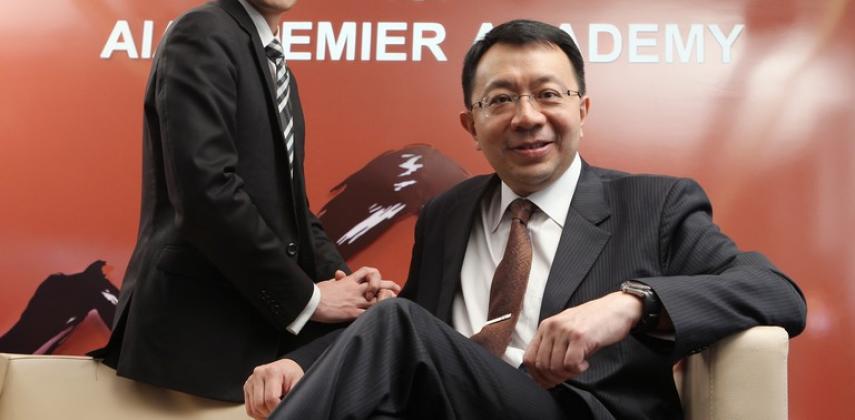AIA recruits can join a top crop of high-flyers
When AIA Hong Kong set up its Premier Academy (AIAPA) in September 2011, the primary aim was to cultivate a cutting-edge team of young and energetic new recruits and continue nurturing a professional sales force.
The second phase of the education, which takes four to five months, was designed as a follow-up to help ensure retention with in-depth training in product knowledge and soft skills, and to share success stories by members of the Million Dollar Round Table (MDRT).
A third phase, the “Road to MDRT”, was created for those who proved themselves. Joining is by invitation. It includes a two-day camp to help attendees immerse themselves in teamwork and reach a sales breakthrough. Extra intensive training is given on products and soft skills.
“Hong Kong is quite unique with its high savings ratio and high education level. There is a big business potential, but also very serious competition,” Jim Jan Zen, head of the AIAPA, says. “The strategic objective of AIAPA is to nurture a young, energetic and professional elite with AIA’s own experience, by offering training, development and business support.”
AIA added another approach for elite applicants who have solid work experience and, based on their background, are expected to have much higher productivity, by introducing the Executive Development Programme (EDP) in January.
“They are fine tigers, the best of the best,” Zen says. “Around the age of 30 their productivity can be almost double what fresh joiners produce. They have more social connections, strong commitment to career and experience, and they are very dedicated and hard working.”
The EDP’s first goal is to train elite members to attain the MDRT membership, a prestigious recognition in the industry. Requirements differ in various markets – in Hong Kong the latest requirement is an annual income of HK$546,000. Zen says out of about three million insurance agents worldwide, about 36,000 reached the MDRT in 2012. The programme’s second goal is to develop AIA’s future leaders.
To qualify for the EDP, applicants have to undergo a strenuous selection process. The interview process is conducted by a panel of four interviewers, all at director level. The 30-minute interview explores the candidate’s career goals, life objectives, and their determination and mental preparation for joining the industry. They should be entrepreneurial, because they will be running their own business, and their people-management skills should also be well developed. Candidates should believe in insurance, be energetic, have good interpersonal skills and have mastered Cantonese, English and Putonghua.
Candidates then have to present a project, Project 100, which evaluates their particular market segment. The panel then prepares a seven-page profiling assessment which is an objective reference of the applicant’s potential strength. “We emphasise quality, rather than quantity,” Zen says. Since the beginning of the year, 41 people have joined the EDP.
The EDP’s revamped training platform offers a more business-orientated seven-day module. Zen says the fact that more mature people are in the class makes a big difference. There is more conversation, sharing and presentations. The classes are more participatory and interactive, where trainees become the key players and teachers act more like facilitators. The EDP encourages them to have a mental breakthrough so that they believe in themselves and achieve the MDRT in a short time.
Ivan Yiu, who joined AIAPA in September 2011 from his job as an accountant, is already a member of the MDRT. Yiu says he immediately committed to AIA and treated it as a lifelong career, not a job. His attitude was passionate and responsible, while he worked hard, looking at everything from the customers’ point of view.
He found the step-by-step learning and sharing by experienced MDRT members of what they had learned in their long careers was very supportive.
“The AIAPA prepared me mentally and psychically. It’s not simply training, it’s a companion,” he says. “We have review sessions which take a look at my weak sides, my daily activities, monitor my development and reinforce my mental preparedness.”
The new job meant a 180-degree change from his original daily routine work to running his own business and managing his own time. He also had to change from a passive back-office employee to an outgoing person able to approach external customers. “It was very challenging at the beginning. Without the MDRT mindset, it would be difficult to improve myself and easy to give up. This reminds me of why I joined, and gives me strong motivation to improve myself,” he says.


